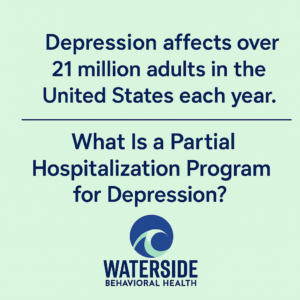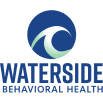When you’re living with depression, even small tasks can feel like mountains. You might already know you need help—but figuring out what kind of help? That’s where many people feel stuck.
If you’ve heard of a “partial hospitalization program” and thought, Wait, is that inpatient? Will I have to stay overnight? Am I even ‘bad enough’ for that?—you’re not alone. These are good, honest questions.
Let’s walk through what a partial hospitalization program for depression is, how it fits into the mental health care system, and why it might be the right choice if you’re seeking focused support but aren’t sure where to begin.
What Is a Partial Hospitalization Program (PHP)?
A partial hospitalization program (often shortened to PHP) is a short-term, intensive mental health treatment option that provides structure and support during the day—without requiring an overnight stay. You go home in the evenings.
At Waterside Behavioral Health in Plymouth, PA, our PHP for depression is designed for adults who need more than once-a-week therapy but don’t require 24/7 hospitalization. It’s a safe place to stabilize, learn, and reconnect with yourself in a setting that balances professionalism and compassion.
Think of it as a “middle path” between outpatient therapy and inpatient treatment—intensive, but still rooted in your real life.
Who Is PHP Designed to Help?
A PHP may be the right level of care if:
- You’re struggling with daily functioning due to depression
- Symptoms like low energy, hopelessness, or withdrawal are impacting work, relationships, or basic routines
- You’ve tried outpatient therapy but need more support
- You’ve recently been hospitalized and need a safe step-down option
- You want a structured setting but also need to be home with family at night
You don’t need to be in crisis to qualify for PHP. In fact, many clients come to us saying, “I’m not okay, but I don’t know what to do next.” That’s exactly the kind of honesty PHP is designed to meet—with steadiness, not judgment.
What Makes PHP Different from Other Treatment Options?
When you’re comparing mental health services, it helps to understand how PHP fits within the broader spectrum of care. Here’s how it compares:
| Type of Care | Inpatient Treatment | Partial Hospitalization (PHP) | Outpatient Therapy |
|---|---|---|---|
| Stay overnight? | Yes | No | No |
| Hours per week | 24/7 care | 25–30 hours/week (typically 5–6 hrs/day) | 1–2 hours/week |
| Intensity of support | High | Medium-High | Low |
| Ideal for… | Crisis stabilization, risk concerns | Daily structure, symptom management | Mild-moderate symptoms |
| Access to psychiatrist | Daily or as needed | Daily or as needed | Typically every few weeks/months |
PHP offers the rhythm and depth of inpatient care—but with more flexibility. It’s ideal for people who need to press pause, but not escape entirely.
What Happens in a Typical PHP Day?
Every program looks a bit different, but here’s what you can expect at Waterside Behavioral Health’s PHP for depression:
- Morning check-ins: Start your day with a grounding exercise, updates, and a sense of direction.
- Group therapy: Led by licensed clinicians, groups might explore topics like managing negative thoughts, building healthier relationships, or navigating emotional triggers.
- Individual therapy: Weekly one-on-one sessions help you process deeper issues and shape your goals.
- Skill-building workshops: These sessions cover practical tools—like emotion regulation, mindfulness, distress tolerance, or communication.
- Psychiatric support: If needed, our team can provide medication evaluations or adjustments.
- Midday breaks: You’ll have time to eat, rest, or recharge before afternoon sessions.
You’re not expected to be “on” all day. Our structure includes time for reflection and rest, and we always match your treatment plan to your current needs—not some ideal version of you.

What Makes Our PHP for Depression Different?
In Plymouth and the surrounding areas, Waterside Behavioral Health offers something unique: a program rooted in clinical excellence that also understands real life doesn’t stop when treatment starts.
Here’s what sets our program apart:
- Local access: No long commutes, hotel stays, or big-city overwhelm.
- Real-world flexibility: You can return home each day to your own bed, your pet, your loved ones.
- Experienced providers: Our team includes licensed therapists, psychiatrists, and care coordinators who specialize in treating depression.
- Whole-person focus: We look at your symptoms—but also your strengths, your hopes, your fears, and your goals.
Whether you’re newly diagnosed or simply ready to stop pretending everything is fine, PHP offers a place to explore healing without needing to do it alone.
Frequently Asked Questions About PHP
Do I need a referral to enter a partial hospitalization program?
Not always. Some people are referred by a doctor or therapist, but you can also self-refer. We offer assessments to help determine if PHP is the right fit for you.
How long does PHP usually last?
Most programs last around 2–4 weeks, but it depends on your goals and progress. Some people stay a little longer, some transition sooner to a lower level of care.
Will insurance cover PHP?
Many insurance plans do cover PHP, especially when it’s recommended as a medical necessity. Our team can help verify your benefits and explain costs up front.
What if I’m nervous about group therapy?
That’s okay. It’s one of the most common concerns we hear. Our groups are led by clinicians who create safe, respectful spaces. You’re always invited to participate—but never forced to share more than you’re ready for.
Can I work or go to school while in PHP?
Because PHP is a daytime commitment, it may not be compatible with full-time work or school. However, many people arrange flexible schedules or take temporary leave. We can help you navigate those conversations if needed.
📞 Let’s Talk—No Pressure
Taking the first step doesn’t mean you’re signing up for everything. It just means you’re open to feeling better.
If you’re wondering whether a partial hospitalization program for depression might help, we’re here to walk you through it—with clarity, compassion, and no judgment.
Call us today at (774) 619-7750 or visit our partial hospitalization program page.
You don’t have to know all the answers. You just have to be willing to ask.




